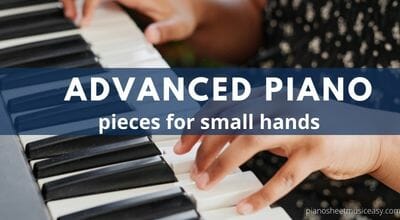There is a lot of very difficult pieces for small hands. Everything of Bach, Mozart. Beethoven Most of Sonatas, early Sonatas, even 30 for Hammerclavier, Liszt: Dance of Gnomes, Debussy Preludes, Chopin most of the Preludes don’t demand big hands, but a lot of stretching (f sharp minor). Scarlatti Sonatas, Mendelson Songs without Words,

I’m looking for piano pieces that are challenging by nature but can still be played at a moderate speed, like Beethoven’s Tempest 3rd movement. Any recommendations? Unfortunately, my hands are short (respectively, 6.8 inches and 7 inches, maximum length), so I may not be able to reach certain notes comfortably (such as the ending octaves in this piece). One trick around this I’ve used is to simply drop notes but I’d prefer to not have to if possible.
Read more :zelda’s lullaby virtual piano [20 Songs ]
advanced piano pieces for small hands
I have small hands too but I’m no longer limiting myself to the repertoire for small hands anymore, I’m learning a lot of normal rep now.I used to though and this is just a list of what I picked with my teacher to learn, most of the pieces just have fewer octaves and a few barely or none.
- Bach- Partita no.2
- Mozart- Sonata in B flat major K570
- Haydn- Sonata in D major Hob:33
- Mozart- Sonata in c minor K457 (complete)
- Haydn- Sonata in E flat major Hob:49
- Chopin- Nocturne in e minor op.72
- Chopin- Preludes op.28
- Debussy- Children’s Corner no.1 Doctor Gradus ad Parnassum
- Turina- Sacro Monte
- Tsisaros- Snow Games
- Prokofiev- a few of visions fugitives
- Chopin etudes- op.10 no.6 op.25 no.2
if I were you I would slowly overcome this problem instead of avoiding pieces with octaves.
if you need to work on octaves a lot,
I would recommend that you practice Chopin’s etude op.25 no.10 slowly every day starting with the 3rd page.
this is what I’ve been doing and I find it very helpful and effective
Who have tiny hands, even boys in 7th grade! I’ve taught the following:
- Schubert–Impromptu in E-flat major, Op. 90, No. 2
- Ibert–Histoire
- Bach–Prelude and Fugue in D minor (WTC-Book 2)
- Chopin–Waltz in B minor, Op. 69, No. 2; Etude, Op. 25, No. 2; Nocturne in C-sharp minor, Op. Posthumous
- Debussy–Dr. Gradus ad Parnassum
- Kabalevsky–Sonatina
- MacDowell–Tarantella, Op. 39, No. 2
- several Sonatas by Scarlatti and Soler
- There are more pieces…I wrote down a list somewhere…
I am not a pianist. But I was married to a very fine classical pianist for 30 years.
For the earlier part of that time, she was afraid of her quite small hands. She dealt with that by becoming something of a baroque specialist. Bach, Scarllatti, Corelli, Handel. These were her meat and potatoes. Anything with tight, intricate fingering.
But she is the finest Mozart interpreter I have heard in person, far better, getting more joy and more “music” out of Mozart than some whose technical skills far passed hers. And she discovered a real gift for lyrical work, Chopin, Mendelssohn.
For her, one of the keys for getting over her fear of “limits” caused by her hand size was playing a lot of Scott Joplin. The looseness required for the big leaps in the left hand taught her to relax, and trust that her fingers knew what to do. These fairly simple pieces ate her lunch at first, but once she mastered them, a huge barrier had been removed and she was free to play quite a bit that was unthinkable before.
Sometimes the problem caused by small hands is not actually in the hands but in the head.